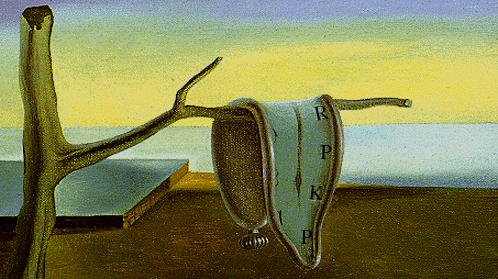
The RetroPsychoKinesis Project
Project Founded by Matthew R. Watkins
School of Classics, Philosophy and Religious Studies
University of Kent at Canterbury, UK
Supervisor: Peter Moore
Retropsychokinesis experiments are now on-line.
You can proceed directly to
run an experiment, or consult the
table of contents which
contains links to all documents related to the experiments. The
experiments and associated tools require a Web browser which
supports Java.
A summary of experiments run
to date is available, updated daily.
Project Updates
Research papers of interest:
* Currently abstract only.
Klaus Scharff has contributed an extensive bibliography of academic articles
relating to the phenomenon of retrocausality (otherwise known as "backwards
time causality", "reverse time causality", etc.). These are taken from journals
of philosophy, physics, cybernetics, psychology, and parapsychology (from 1837-1996), and taken collectively, suggest an
entirely new branch of academic inquiry.
compiled by Dick Bierman of
The Anomalous
Cognition Project (Amsterdam University)
"...DAT leads to the idea that there may be only one underlying
mechanism of all anomalous mental phenomena, namely a transfer of information
from future to past."
(from May, et.al.'s "Decision Augmentation Theory: Toward a Model of Anomalous Mental
Phenomena", Journal of Parapsychology, Vol 59, Sept. 1995. Emphasis ours.)
"Psi reminds us that the world is profoundly richer and more
subtle and more intensely numinous than our science or philosophy has imagined,
that wonder and awe in the face of the Universe is not a sign of simple minds,
but of those rare minds that have not congealed into lumps of paralyzed skepticism"
(from Radin's 1993 presidential address to the Parapsychological Association)
Brian Josephson: "In view of the increasing importance of the subject..."
The Mind-Matter Unification Project was established by Professor Brian Josephson of the Cavendish Laboratory, Cambridge. In 1973, Josephson was awarded
the Nobel Prize in physics for his theoretical predictions of the properties
of a supercurrent through a tunnel barrier (now known as Josephson
effects). He currently considers PK, etc. to be sufficiently important
to add a parapsychology
page to his website.
There you can find
A fascinating article posted to the list QUANTUM-D, discussing, among other things, Henry Stapp's
controversial 1994 modification of quantum
mechanics which accomodates RPK-phenomena. Stapp acted as an independent observer
on some of Helmut Schmidt's more recent experiments, which led him to develop
this model.
A Website appeared recently (June 3rd, 1996) which may come to play an important role in the future development
of online (retro)PK experiments. Created by
John Walker, the HotBits site provides arbitrary
quantities of true-random bits generated by a Geiger-Muller tube exposed to a
Krypton-85 source and interfaced to a computer. The site provides
a request
form whereby users can "order" random bits in the format of their choice,
plus a test program for randomness, hardware and software descriptions, and an
excellent account of how
the mechanism works to produce "truly random" data.
Interesting Links:
More Links (semi-relevant/amusing/bizarre)
"I think that many of the problems we have come from a too narrow
scientific paradigm or model of reality which creates a split between the
mind of educated people and their feelings and experience. This creates a
split in our entire culture which is at the root of our ecological crisis
and the sense of alienation and loss of meaning. I think a more holistic
and inclusive scientific approach will help heal this split and improve our
relations with the natural world around us and each other" -- Rupert Sheldrake
RPKP wishes to thank Helmut Schmidt
for his continuing advice and encouragement, as well as the loan of a
noise-based true random generator. Thanks also to
Roger Nelson at the
Princeton Engineering
Anomalies Research lab, Peter Moore
in Theology and Religious Studies (UKC),
Sir Robert Bunkum for guidance,
spiritual and grammatical, Eldad Druks for graphical assistance, and
the Alethea group for technical advice.

